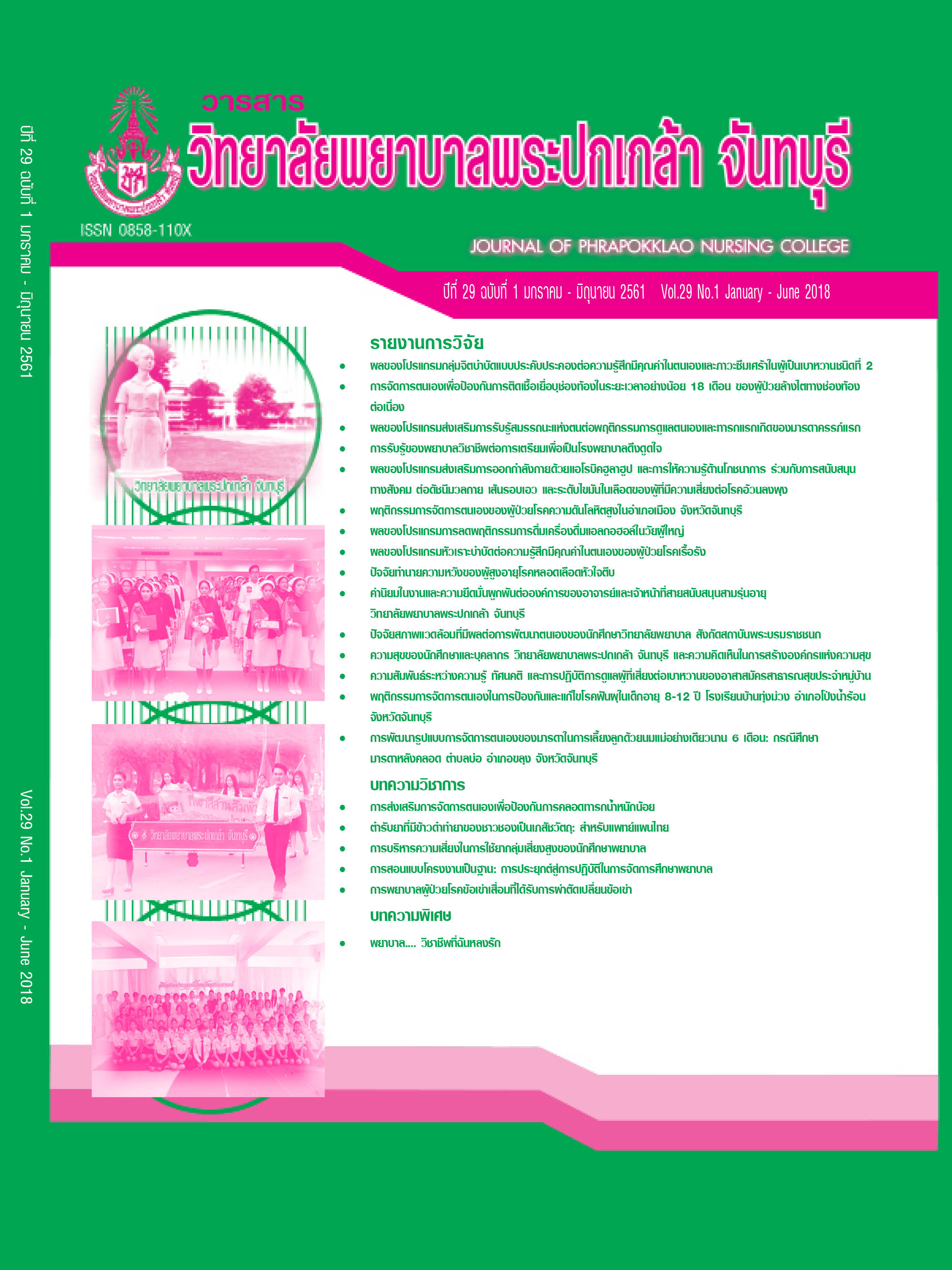The Effect of a Laughter Therapy Program on Self-esteem among Chronic Disease Patients
Keywords:
Laughter Therapy, Self-esteem, Chronic disease patientsAbstract
The purpose of this quasi-experimental research was to determine the effect of a Laughter Therapy Program on self-esteem among chronic disease patients. The samples consisted of 64 chronic disease patients receiving service at Phliu Subdistrict Health Promoting Hospital, Laemsing District, Chanthaburi Province. The research instruments were composed of a Laughter Therapy Program, and a questionnaire of self-esteem with the reliability of .74. The implementation and data collection were conducted from October to December, 2016. Statistics used for data analysis included frequency, percentage, mean, standard deviation, and paired t-test.
The research result revealed that after the experiment, the samples had statistically significant higher mean score of self-esteem than that before the experiment (t = 6.144, p < .01).
This research suggested that laughter therapy should be continuously apply to promote self-esteem among chronic disease patients, concerning of various-sector involvement.
References
จิตรา ดุษฎีเมธา. (2556). ผลของโปรแกรมการหัวเราะบำบัดที่มีต่อสมรรถภาพการทำงานของปอด และระดับคอร์ติซอลในผู้ปวยโรคหืด. วารสารพยาบาลตำรวจ, 5(2), 19-32.
นริสา วงษ์พนารักษ์, และอภิญญา วงศ์พิริยโยธา. (2558). การศึกษาความสัมพันธ์ระหว่างการเห็นคุณค่าในตนเอง การสนับสนุนทางสังคม กับคุณภาพชีวิตของผู้ป่วยพิการในเขตเมือง. วารสารพยาบาลทหารบก, 16(3), 14-22.
วัลลภ ปิยะมโนธรรม, และจิตรา ดุษฎีเมธา. (2550). หัวเราะบำบัด. กรุงเทพฯ: ใกล้หมอ.
สุพัตรา ศรีวณิชชากร. (2560). สถานการณ์การป่วยและการตายด้วยโรคไม่ติดต่อเรื้อรัง (โรคเบาหวานชนิดที่ 2 และโรคหัวใจและหลอดเลือด) ในประเทศไทย ในระยะ 5 ปี (2553-2557). วารสารควบคุมโรค, 43(4), 379-390.
อมรา ทองหงษ์, กมลชนก เทพสิทธา, และภาคภูมิ จงพิริยะอนันต์. (2555). รายงานการเฝ้าระวังโรคไม่ติดต่อเรื้อรัง พ.ศ. 2555. สืบค้น 2 มิถุนายน 2560, จาก http://www.boe.moph.go.th/files/report/20140109_40197220.pdf
อิศวร ดวงจินดา. (2558). คุณภาพชีวิตผู้ป่วยโรคเบาหวานชนิดที่ 2 อำเภอหนองหญ้าไซ จังหวัดสุพรรณบุรี. วารสารวิชาการสาธารณสุข, 24(6), 1118-1126.
Cha, M. Y., Na, Y. K., & Hong, H. S. (2012). An effect of optimism, self-esteem and depression on laughter therapy of menopausal women. Journal of Korean Academy of Women’s Health Nursing, 18(4), 248-256. Retrieved June 2, 2017, from https://synapse.koreamed.org
Chang, C., Tsai, G., & Hsieh, C. J. (2013). Psychological, immunological and physiological effects of a Laughing Qigong Program (LQP) on adolescents. Complementary Therapies Medicine, 21(6), 660-668. Retrieved June 2, 2017, from https://www.ncbi.nlm.nih.gov/pubmed/24280475
Coopersmith, S. (1981). Stanley Coopersmith 1926-1979. Retrieved June 2, 2017, from https://stanleycoopersmith.wikispaces.com
Donnellan, M. B., Trzesniewski, K. H., Robins, R. W., Moffitt, T. E., & Caspi, A. (2005). Low self-esteem is related to aggression, antisocial behavior, and delinquency. Psychological Science, 16(4), 328-335.
Kataria, M. (2015). Laughter Yoga International. Retrieved June 10, 2015, from https://www.laughteryoga.org
Kim, S. H., Kook, J. R., Kwon, M., Son, M. H., Ahn, S. D., & Kim, Y. H. (2015). The effects of laughter therapy on mood state and self-esteem in cancer patients undergoing radiation therapy: A randomized controlled trial. The Journal of Alternative and Complementary Medicine, 21(4), 217-222. Retrieved June 2, 2017, from https://www.ncbi.nlm.nih.gov/pubmed
Kim, Y. K., Park, K. M., & Kim, C. N. (2008). Factors influencing the health status and life satisfaction of elders in free and charged welfare facilities. Journal of Korean Academy of Community Health Nursing, 19(2), 317-325.
Kwon, J. D., & Cho, J. Y. (2000). A study of factors influencing the life satisfaction of the elderly. Journal of the Korea Gerontological Society, 20(3), 61-67.
Lebowitz, K. R, Suh, S., Diaz, P. T., & Emery, C. F. (2011). Effects of humor and laughter on psychological functioning, quality of life, health status, and pulmonary functioning among patients with chronic obstructive pulmonary disease: A preliminary investigation. Heart & Lung: The Journal of Acute and Critical Care, 40(4), 310-319.
Nanthamongkolchai, S., Makapat, A., Charupoonphol, P., & Munsawaengsub, C. (2007). Self-Esteem of the elderly in rural areas of Nakhon Sawan Province. Journal of the Medical Association of Thailand, 90(1), 155-159.
Song, M., & Park, K. M., & Park, H. (2013). The effects of laughter-therapy on moods and life satisfaction in the elderly staying at care facilities in South Korea. Journal of Korean Gerontological Nursing, 15(1), 75-83.
Downloads
Published
How to Cite
Issue
Section
License
Copyright (c) 2018 Journal of Phrapokklao Nursing College

This work is licensed under a Creative Commons Attribution-NonCommercial-NoDerivatives 4.0 International License.
เนื้อความ ข้อมูล และรายการอ้างอิงที่ผู้เขียนใช้ในการเขียนบทความเพื่อลงตีพิมพ์ในวารสารวิทยาลัยพยาบาลพระปกเกล้า จันทบุรี ถือเป็นความคิดเห็นและความรับผิดชอบของผู้เขียน คณะผู้จัดทำวารสารไม่จำเป็นต้องเห็นพ้องด้วยหรือร่วมรับผิดชอบ
บทความที่ได้รับการลงตีพิมพ์ในวารสารวิทยาลัยพยาบาลพระปกเกล้า จันทบุรี ถือเป็นลิขสิทธิ์ของวารสารวิทยาลัยพยาบาลพระปกเกล้า จันทบุรี หากหน่วยงานหรือบุคคลใดต้องการนำส่วนหนึ่งหรือทั้งหมดของบทความไปเผยแพร่ต่อเพื่อวัตถุประสงค์ใด ๆ จะต้องได้รับอนุญาตจากบรรณาธิการวารสารก่อน



